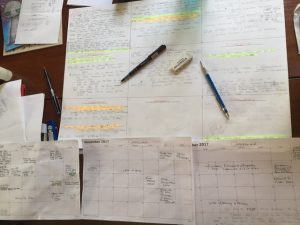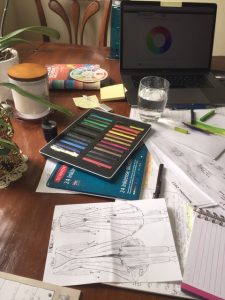
Victoria’s writing space #1
Over the years, I’ve mentored scores of writers on their quests to write or finish writing a book. Recently, I had the privilege of mentoring Victoria on her quest to write a children’s chapter book about the fashion industry. Her main character Georgiana dreams of one day becoming a famous fashion designer, but thanks to fellow students, demanding models and a degree of over-confidence, her first year at fashion school doesn’t go to plan.
It’s been fascinating watching Victoria develop her writing technique and for her book to bloom. So I asked her about the process.
What have you learnt about yourself through writing this book?
As a designer/patternmaker, I’m used to the tight deadlines that are so prevalent within the fashion industry, and I do my best work under that pressure. I’ve realised writing is no different, I focus best when I have a deadline, so it was good to have a mentor setting me targets. It wasn’t always easy. Sometimes I would get sidetracked, for hours, while doing research and end up knowing a lot more about the subjects I was researching but no further along in my book! Sometimes I also found myself doing anything to avoid sitting in front of the computer – my apartment was so clean!
I also learnt the power of taking a break from my story if I wasn’t happy with what I’d written or if I had trouble prioritising events within the story. The words would become a jungle for me so I just had to walk away from it for a few days. Luckily, Zena said that was a common technique to use! It did mean, however, that it was difficult to get back into the story after the break. Once I started writing again it would take an hour or more to get my headspace back into my characters and the storyline. But the break was always beneficial and afterwards the story flowed with much better energy.
I also discovered that my character often mirrored my life to a certain extent, and the story ran concurrently with mine in exactly the same months my story was set.
What was the most personally challenging aspect of the process?

Victoria’s writing space #2
That writing is such a solitary life! For me this is hopefully a career change, eventually, so I had no choice but to sit in front of my computer and treat it as a job and write. It’s actual work! In the beginning it was slightly easier, but as I got into the story I needed to create spreadsheets to keep track of events, and I kept a pad and pen beside my bed and in the bathroom – loads of scenes and ideas would come to me while I was in the shower! If I didn’t write those ideas down, in the time between having that idea and sitting down to write an hour or so later, I would forget them! I often got ideas while I was on long walks, so I started taking my mobile with me to work through scenes.
What was the most surprising delight?
After spending so much frustrating time rewriting paragraphs, layering the characters and story to add depth and substance, it was amazing to watch the scenes unfold and come together. When that happened I became so involved with the story, I burnt my dinner and pots, on more than one occasion, creating an awful smell for days in my home!
It also frustrated me that I couldn’t get a title for my book all the time I was writing it. Luckily, as I was scribbling words on a page after the book was finished and not really thinking about anything, the title came to me in a flash.
Writing this book has also stretched me to find new ways to use the English language in a more interesting structure.
How did your expectations match the practice of writing?
 I realised, as I got into the story, that it was rather like a chess game. I thought my story would automatically fall into a flowing timeline, but I had to constantly revisit previous chapters to double check aspects of what I had written. I started a diary and wrote chapter summaries so I could reference the information I needed quickly. I have to be extremely well organised in my current job as a designer, so when Zena suggested spreadsheets it really started to fall into place for me. In fashion, we make large mood boards and put all our colours and emotion into them to get a feel for a new range. The same applied when I made large A3 pages blocking out each month of the story and then printing out calendar pages to work out the finer details of the story and timeline. This is when it really started to become a piece of magic for me, my story really started to come alive then. I had to be as organised as I was in my current fashion career, otherwise I knew I would flounder.
I realised, as I got into the story, that it was rather like a chess game. I thought my story would automatically fall into a flowing timeline, but I had to constantly revisit previous chapters to double check aspects of what I had written. I started a diary and wrote chapter summaries so I could reference the information I needed quickly. I have to be extremely well organised in my current job as a designer, so when Zena suggested spreadsheets it really started to fall into place for me. In fashion, we make large mood boards and put all our colours and emotion into them to get a feel for a new range. The same applied when I made large A3 pages blocking out each month of the story and then printing out calendar pages to work out the finer details of the story and timeline. This is when it really started to become a piece of magic for me, my story really started to come alive then. I had to be as organised as I was in my current fashion career, otherwise I knew I would flounder.
What technical aspects of writing did you find the most challenging?
Quotation marks and punctuation are my nemesis. I would write so fast to get the words out, otherwise I would forget them, but then I would put the commas and quotation marks in the wrong positions or omit them altogether, and I still do it. I also struggled to find a natural break in the story to end each chapter. I have always been a very good speller, being one of the top in my school, but my vocabulary was lacking and I found the Thesaurus an exceedingly good friend indeed. I kept notes of grammar and formatting from each of my sessions with Zena, but I still don’t find this aspect of writing easy.
What was your lowest point? Did anything bring you close to tears?
The first time I was on a computer it was in a CAD system for patternmaking, I had never worked with Word or Excel so struggled with those programs, constantly. Formatting my story was also an issue for me, and when things go wrong, I make a mountain out of what is usually a gentle plain. I had to re-read paragraphs and correct segments of my story and in the process I lost paragraphs on more than one occasion. One day I thought I had lost a whole chapter, possibly more. I sat in front of the computer and sobbed. I did find it again in another chapter, and have had other issues since that day, but I learnt a valuable lesson to download the book every time I worked on it.
Would you recommend mentoring to other writers? Why?
 I do like to be in a class because it is very interesting having everyone bouncing ideas and suggestions around. But when it actually comes to the lengthy process of getting the book written, I highly recommend working with a mentor. I personally find I need to be accountable to someone when I am learning something new – there is absolutely no way I would have finished my book within the time that I had with Zena, or that it would be anywhere near as technically correct as it is now. A mentor is there for you during the time allocated for you, and you don’t have another student making demands on your tutor at the same time, so for purely selfish reasons, my mentor is mine only, for that time and it is GOLD.
I do like to be in a class because it is very interesting having everyone bouncing ideas and suggestions around. But when it actually comes to the lengthy process of getting the book written, I highly recommend working with a mentor. I personally find I need to be accountable to someone when I am learning something new – there is absolutely no way I would have finished my book within the time that I had with Zena, or that it would be anywhere near as technically correct as it is now. A mentor is there for you during the time allocated for you, and you don’t have another student making demands on your tutor at the same time, so for purely selfish reasons, my mentor is mine only, for that time and it is GOLD.
Also as I got deeper into my story I found it hard to remain impartial to it. You need an outside influence to push your buttons and make you go deeper into the characters, even though you think there isn’t anything more to add.
Also the constant advice on hand with a mentor is invaluable.
Have you got any advice for writers setting out on their writing journey?
 It is a long process and I had to learn patience, but I really believed in my story and characters. If you don’t write from experience or knowledge of your subject, then it is not going to be believable for your reader, so put as much of yourself into your characters as you can. I have had to learn all of this along the way and, even though I haven’t found it easy at all, it has been immensely enjoyable.
It is a long process and I had to learn patience, but I really believed in my story and characters. If you don’t write from experience or knowledge of your subject, then it is not going to be believable for your reader, so put as much of yourself into your characters as you can. I have had to learn all of this along the way and, even though I haven’t found it easy at all, it has been immensely enjoyable.
Also, make notes about the process as you go, and about anything you think might be relevant to your story, even if it appears inane at the time.
One piece of invaluable advice that Zena told me was to treat it as a movie, show the actions to the reader so it becomes alive, and watch relevant movies to the story you are writing. I now find I listen to the script and watch how the director has planned out a scene when I go to the cinema. It really helps with dialogue!
Thank you!
Wow, thank you, Victoria for sharing so much about your writing journey with us! You can follow Victoria’s progress on Instagram and Facebook as @victoriahannahstudio and read more about her work in fashion and print cards at https://victoriahannah.com.au/
Think you need a mentor? Get in touch!





